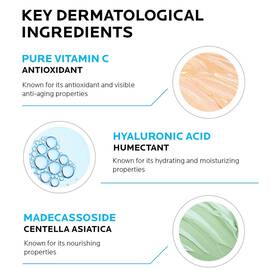DERMATOLOGIST TIPS FOR AGING SKIN

Updated: 04/12/2021
SUMMARY: When one looks in the mirror they might notice one or two signs of aging, including wrinkles, fine lines, dullness, uneven skin tone, and rough, dry skin. Although there are many daily tips to follow when trying to mitigate the signs of aging, we recommend these essential tips for aging skin to include in your everyday routine.
- Protect against UV exposure
- Hydrate skin
- Do not only focus on your face
- Think about your overall lifestyle
- Incorporate dermatologist recommended anti-aging ingredients into your routine
SKINCARE TIPS FOR AGING SKIN

Protect your skin from sun exposure every day.
The most important tip for aging skin is to protect your skin from sun exposure everyday. The sun’s rays make our skin age quicker and signs of aging more visible. Even on cloudy days, up to 80% of UV rays can reach your skin1. Dermatologists and the American Academy of Dermatology recommend these tips for protecting your skin from the sun2:
- 1. Use a broad-spectrum, water-resistant sunscreen of SPF 30 or higher every day, even during the winter months or on cloudy days.
- Seek shade. Be sure to seek shade between 10 a.m. and 2 p.m. and whenever your shadow looks shorter than you are.
- Cover up whenever possible by wearing a wide-brimmed hat, pants, and long sleeves. Gloves can help to minimize age spots on hands. Sunglasses help reduce wrinkles and fine lines around our eyes that may be caused by the sun.
Hydrate your skin daily.
A second skincare tip for aging skin is to hydrate your skin daily. Moisturizing helps to keep skin looking healthy and youthful. As we age, skin may become drier, and fine lines and wrinkles can appear to be more prominent3. Using a moisturizer, such as Toleriane Double Repair UV Face Moisturizer, daily will help lock in essential moisture.
Do not only focus on your face.
Third, do not only focus on your face. The eyes, hands, and neck are some of the first areas to show signs of aging since skin in these areas are thinner, delicate, and often exposed to the sun. Use specific eye care products and wear sunglasses to protect your eyes from the sun and to avoid squinting, which can cause fine lines. Make sure to extend your skincare products, including your SPF, down to your neck and onto the back of your hands4.
Think about your overall lifestyle. Finally, in addition to skincare tips, your lifestyle plays a role in the health of your skin. Research suggests that a healthy diet consisting of foods high in antioxidants, fruits, vegetables, and healthy fats can help reduce signs of aging5. Also, in your routine always get a recommended amount of sleep (7-9 hours) each night. Avoid smoking as tobacco smoke contains toxins that can lead to smoker’s face which includes dull and dry complexion, loss of skin’s firmness, premature lines and wrinkles, and leathery skin6. Always follow a lifestyle in the context of your own specific routine and situation understanding that you know your body best.
Incorporate dermatologist recommended anti-aging ingredients into your routine. In addition to using a sunscreen and moisturizer, it is important to treat your skin with dermatologist recommended anti-aging ingredients to fight aging skin. Common anti-aging skincare ingredients include retinol, vitamin c and hyaluronic acid. These are available over-the-counter in a variety of formats such as serums, creams, masks, lotions and in a range of concentrations. If you have sensitive skin, it is better to start with a lower concentration and begin with using the product 1-2 times a week and gradually increase usage until your skin has built up a tolerance. If you have sensitive skin, look for allergy-tested formulas and test the product yourself on your inner forearm to see if a reaction occurs before applying it to your face and neck. It’s important to be patient and give the product time to work and continue use consistently in order to see results. Click HERE to read more about dermatologist recommended ingredients for aging skin.
NEXT ARTICLE: DERMATOLOGIST RECOMMENDED ANTI-AGING INGREDIENTS FOR SENSITIVE SKIN
References
- https://www.who.int/uv/publications/en/UVIGuide.pdf
- https://www.aad.org/public/everyday-care/skin-care-basics/care/skin-care-in-your-40s-and-50s
- https://www.aad.org/public/everyday-care/skin-care-basics/care/skin-care-in-your-40s-and-50s
- https://www.aad.org/public/everyday-care/skin-care-basics/care/skin-care-in-your-40s-and-50s
- https://academic.oup.com/ajcn/article/86/4/1225/4649573
- https://www.aad.org/public/everyday-care/skin-care-basics/care/skin-care-in-your-40s-and-50s





